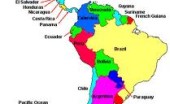Johannah Bernstein post: "eternally proud of my father’s extraordinary aeronautical engineering. legacy. here is a photo of the Canadair Water…
Jacques Clément on China's economy
Written by Diana Thebaud Nicholson // February 9, 2005 // Economy, Infrastructure, Jacques Clément, Wednesday Nights // Comments Off on Jacques Clément on China's economy
After 9½% economic growth lat year, China (Asia’s fastest growing economy and the second largest in the world). China’s G..D.P. should grow by 7½% to 8½% this year, given the artificially weak currency that has been prevailing for the last ten years, with an exchange rate of 8.28 Yuan per U.S. dollar. Consumer spending has averaged over 8% in the past six years, but is not sufficient, given the 1.3 billion population in over 600 cities. The record trade surplus with the U.S. totalled over $130 billion last year. China is the second largest oil importer and the sixth top producer. They exported close to $595 billion last year, a rise of over 35%. The record current account surplus has attracted an over $60 billion record in foreign investments last year to $153 billion, an increase of 33%. China has too much invested in their economy and they have encouraged Chinese direct investments overseas, which have risen by 27% last year to over $3.6 billion. Future investment spending plans have risen by $78%.
The personal savings rate has risen to a record 40%. The industrial sector is booming at a 15% annual rate. They will be spending $12 billion U.S. in railway construction and have $242 billion in long-term spending with contracts with Japan, France and Germany. With their intervention in the exchange market, their foreign currency reserves have increased by $207 billion last year, to a record $610 billion, equivalent to 13% of G.D.P. The currency is equivalent to a 23% subsidy on its exports. General Motors sold over 490,000 new vehicles to China in 2004, a rise of 27%, after 46% in 2003.
Despite the renewed pressure from the G-7 countries, the Central Bank has no immediate plan to let the value of the Yuan rise nor to ease the tight currency controls. Both the Bank of China (one of the big four commercial banks) and the National Economic Research Institute said in Davos two weeks ago, that they are “under no pressure to revalue its currency and do not think that it will happen in the next six to eighteen months, given the need to complete the recapitalization of its banking system, the reform of its financial system, the deepening of its foreign exchange and capital markets.” They have huge problems of bad loans and they are worried that floating the Yuan too soon would cause a banking crisis. They have used $45 billion U.S. of foreign reserves to recapitalize two large Chinese banks. Sixteen major commercial banks have shed nearly $48 billion of bad loans, and non-performing loans of the banking system are equivalent to over 13% of total lending by the banks.
China also needs to reform the social security system in order to give households more confidence to spend. Eventually, it is planned to let the Yuan trade freely, but the priority will be to broaden the exchange rate for the Chinese currency from the U.S. dollar to a more flexible basket of currencies (perhaps the Euro, the Yen and the U.S. dollar, etc.), as “they have lost faith in the stability of the latter.” The message to the U.S. for some time has been that “they should do more to tackle their record current account deficit and put their own house in order; [which they perceive as] the root cause of global imbalance”.



